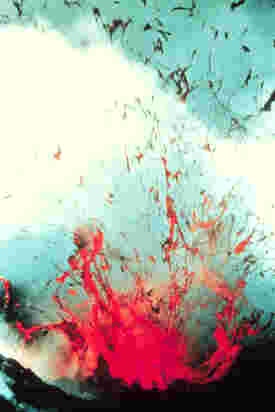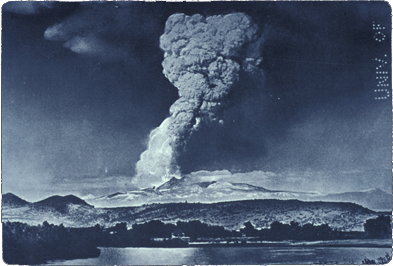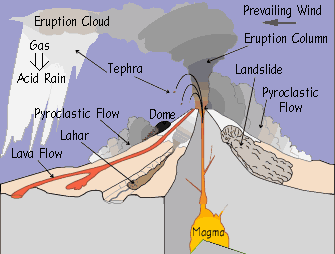What is earthquakes?

An earthquake is a trembling or a shaking movement of the earth's surface. We know that the surface of the earth or its crust is split into tectonic plates that are floating on a layer of molten magma which lies beneath them. When these plates collide or pull apart, the earth shakes and trembles.
Can we predict earthquakes?

To some extent, it is possible. Scientists have developed sensitive instruments which can detect small movements of the earth's crust and the build up of stress in rocks.
Scientists have also looked at natural warning signals including weird animal behaviour, and changes in the water table, stream flow, water levels and patters of electrical currents in the ground. Yet, to date, nobody has been able to predict earthquakes reliably enough to allow people to be evacuated from cities threatened by a quake.
AMAZING
In japan, people thought earthquakes were caused by giant catfish wriggling about on the sea bed, The gods had to put a rock on the fish's head to make it stay still.
How do deep do earthquakes go?

Earthquakes occur in the earth's crust or upper mantle. Most earthquakes occur at depths of about 25 km.
The centre or source of the earthquake is known as the focus. The surface region directly abouve the focus is known as the epicentre.
Earthquake have their focus at depths upto 70 kms are known as shallow focus earthquakes. Those that have their focus at depths between 70 to 300 kms are intermediate focus earthquakes, and those that have their focus at depths between 300 and 700 kms are deep focus earthquakes.
Generally speaking, the deeper the focus of the earthquake, the rarer it is, and the greater the damage it will cause. Most deep fous earthquakes occur in what is known as circum-Pacific belt.
What is Volcano?

A volcano is an opening in the earth;s surface or crust, which allows hot, molten rocks, ash and gases to erupt from deep below the surface. Over a period of time, the hot molten rock that has poured out, cools to form a mountain around the opening. When a volcano erupts, it will destroy everything for miles around.
Volcanoes that keep on erupting are active volcanoes. Those that have not erupted for many years are dormant volcanoes. Volcanoes that haven't erupted for millions of years and are unlikely to erupt again are extinct volcanoes
Where do most earthquakes occur?
Did you know that in Japan earthquakes occur almost daily? Of course, they are very mild and do not do any damage. Another place that has frequent earthquakes is the Mediterranean regions.
Why do volcanoes appear only in some places?

Most of us in India will never see a volcano in our lifetime. This is because volcanoes form only in certain places.
Volcanoes form only in places where the earth's crust is weak. Such weak spots are usually found where the edges of the tectonic plates meet. When the plates move, the melted rock and gases from deep inside the earth find the weak spots and gush out with tremendous force.
Such weak spots occur in Central America, bodering the Pacific Ocean. Two thirds of the world's active volcanoes have been found in this area. Which is called the 'Ring of Fire' The Volcanoes around Hawaii, however are not created by a tectonic plate, but hot spots. Hot spots are places where the layer below the earth's crust, known as the mantle, is so hot that it causes magma to bubble and move to the surface in a column called mantle plume
Why do some places have frequent earthquakes?
The reason is that the earth's crust is not the same everywhere. In some places, there are cracks or faults in the rocky plates that form the crust of the earth. Where such a fault exists, one rock may rub against the other, causing vibration. These vibrations travel thousands of kms as an earthquake.
Do Volcanoes have different shapes?

Indeed they do! The difference arise from the way they are made, the type of lava and the kind of volcanic material. The most common are the shield, the dome, the cinder cone and the strato volcano

Shield volcanoes are the type found in Hawaii. They are shaped like wide sloping mounds. The lave from the shield volcanoes is liquid and flows from the crater and the sides of the volcano

The most dangerous volcanoes are the dome volcanoes. The volcano in Lassen Peak, California, is a dome volcano that erupted in 1915. The Lava from the dome volcanoes is thick lava that forms cones shaped steep domes.

The cinder cone volcanoes can be explosive also. Their cones are formed from cinder, which are small, jagged pieces of rock and ash. The particutin Volcano in Mexico is a cider cone volcano.

Most of the Volcanoes are stratovolvacanoes. They are more active than shield volcanoes, but not as explosive as cinder cone or Dome volcanoes. Mount Fuji in Japan is a stratovolcano. So, we see that volcanoes come in different sizes and shaped like cones. Others like long crack in the earth's crust. Some are very small and very steep. Some are huge...but all can cause a great damage if they erupt!
Why do Volcanoes erupt?

We know that underneath the surface of the earth is a layer of molten rock called magma. This magma is so hot that it keeps rising until it mixes with the gases that are found just below the surface. Since the magma and gases are trapped and cannot escape pressure builds up. Finally, the pressure becomes so great that the red hot magma, steam and gases blow out through a vent on top or side of mountain and the volcano erupts.
Volcanic eruptions can also be accompanied by earthquakes, floods, hot ash flows and tidal waves. which can often proven even more devastating than the actual eruption.